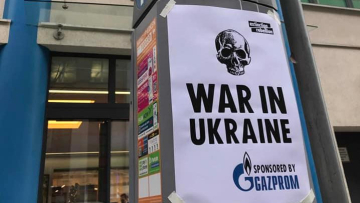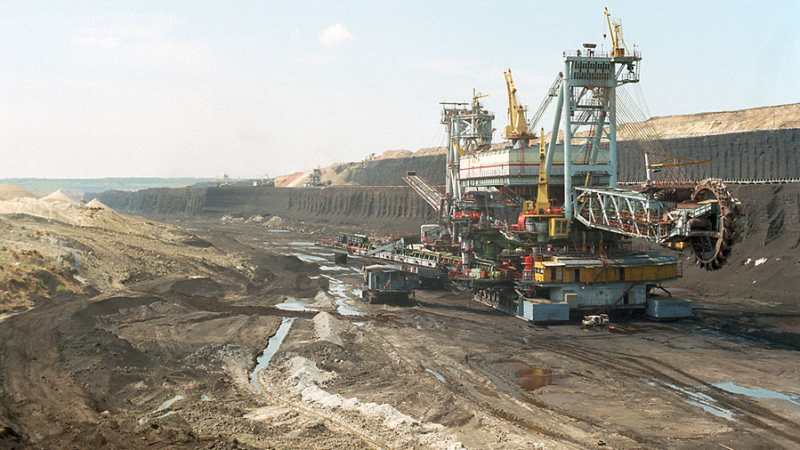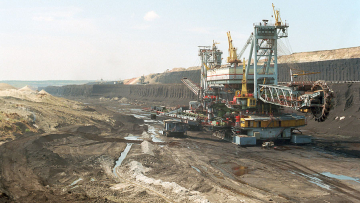
Company – On record
This profile is no longer actively maintained, with the information now possibly out of dateBankTrack
climate@banktrack.org

Company – On record
This profile is no longer actively maintained, with the information now possibly out of dateBankTrack
climate@banktrack.org
Why this profile?
SUEK's coal production of more than 100 million tonnes means the company is a large contributor to the adverse impacts of climate change. It also contributes through taxes to Russia’s military budget.
What must happen
As a major coal producer, banks should avoid any finance for SUEK.
| Sectors | Coal Mining , Coal Electric Power Generation |
| Headquarters |
|
| Ownership |
SUEK is a privately held company. Up until March 2022, its biggest shareholder was Andrei Melnichenko, who indirectly owned a 92.2% stake. Due to international sanctions, Melnichenko resigned and now his beneficial share amounts to 0%. Currently, no further information on SUEK’s ownership is available.
|
| Subsidiaries |
|
| Website | http://www.suek.com |
SUEK (Siberian Coal Energy Company, founded in 2001) is Russia's largest coal company and is among the world's top 10 largest coal producing companies. SUEK’s coal business includes coal mining, coal washing plants, ports and transportation. SUEK serves both European and Asian markets. The company operates 26 coal power plants and one gas power plant, with a combined installed energy production capacity of 17.6 GW.
Impact on human rights and communities
Impacts on Indigenous communities Suek is one of the largest coal producers in Kemerovo Oblast-Kuzbass (Southern Siberia), operating eight underground mines and two open pits. However, in this region, most of the mining activities are carried out on indigenous peoples’ lands (Anti-Discrimation Centre Memorial - ADC, 2020 Report, page 5 and 7). Coal mining activities in Southern Siberia are responsible for irreparable damages to Indigenous communities’ livelihoods, habitats and religious and cultural sites.
Indigenous people inhabiting southern Kuzbass say that open-pit mining and coal operations emptied out their rivers and made harvesting berries and mushrooms impossible because of the coal dust covering them (EcoDefense, p. 46). As such, these communities face loss of their livelihoods and traditional lifestyle as well as water scarcity and forced displacement (ADC, from p.46).
Health impacts In Southern Siberia most of the coal is extracted from open-pit mines, and several of SUEK’s mines in the region are open-pit mines (including two in Kemerovo and four in Khakasia). This type of mine has even worse effects on the environment and people’s health than underground mines. Open pits release a much higher amount of noxious dust into the air than underground mines, and the toxic dust produced has led to an increase of oncological and respiratory illnesses (ADC, p. 33).
EcoDefense found that in the Kemerovo Oblast-Kuzbass region “respiratory diseases are the leading cause of morbidity, which is associated with a high concentration of coal and metallurgical enterprises” (EcoDefense, p.14). Furthermore, the Kemerovo Oblast-Kuzabass and Khakasia regions rank respectively second and third in cancer mortality rate in Russia (ADC, p.32 and 45).
War in Ukraine Suek’s influential position within the Russian economy as the largest coal producer makes it one of the companies contributing to Russia’s economic capacity to wage war on Ukraine. In 2021 alone, Suek paid 835 million USD to the Russian state budget. As such, Suek is helping to finance the Russian state as it commits war crimes and crimes against humanity in Ukraine.
Impact on climate
Greenhouse gas emissions In 2019, SUEK’s methane emissions from its coal business amounted to 245.2 million tonnes (Sustainability Report, page 126). In 2020, the company’s CO2-equivalent emissions were estimated to amount to 223 million tonnes.
SUEK, which already operates 26 coal power plants and one gas power plant with a combined installed energy production capacity of 17.6 GW and in 2021 alone produced 102.5 million tonnes of coal, intends to develop new coal mines and power plants. These developments would allow the company to produce further 1645 MW of coal power and 99.8 million metric tonnes of coal per year. Such expansion plans have been considered “reckless and irresponsible” in light of the current climate crisis.
Impact on nature and environment
SUEK’s coal mines have major adverse impacts on the environment, including through discharges of toxic waste into waters. As an example of the company’s harming activities, SUEK’s Vostochno-Beysky mine, which is one of the seven open-pit mines of the Beysky Coal deposit, contributes to the pollution of the Koybalskaya Steppe in the Khakasia region. In particular, mining waste from the operation of the Vostochno-Beysky, together with other mines in the region, has some of the worst effects on the Steppe’s ecosystem.
The accumulation of waste piles from the mines has led to the shrinking of grazing, haymaking and crop areas in the Steppe (ADC p. 41). Coal mining is also responsible for water contamination as a consequence of untreated wastewater discharges in rivers and lakes and of the explosive work done at the pits (ADC p. 38-39). As waste waters contain petroleum products, heavy metals, explosive remnants and alkaline byproducts, water quality deteriorates and not only are lakes and rivers’ flora and fauna put in danger, but also wells with drinkable water start to vanish.
Mining activities in the Kemerovo Oblast-Kuzbass have led to irreversible damage and destruction of surface waters and groundwater bodies. As SUEK is the second-largest coal producer in the region (25.1 million tons of coal per year), it also figures among those companies that are the most responsible for the eco-disaster in the Kemerovo Oblast-Kuzbass.
The EcoDefense Report 2021 shows that this region is the most polluted one in Russia. According to the report, the rivers Tom and Inya are the ones most affected by coal industry discharges and the Inya has practically lost its properties as a water resource. As a consequence of toxic effluents and passthrough discharges, water is no longer suitable for drinking and food preparation (ADC, p. 51).
The 2023 Banking on Climate Chaos report found that commercial banks gave USD 2.6 billion in finance to SUEK via corporate loans and bonds issuance underwriting.
In September 2021 SUEK issued USD 500 million in bonds, maturing in 2026, which were underwritten by nine commercial banks. See below for more details on banks involved.
In January 2020 SUEK issued RUB 30 billion (approximately EUR 351 million) in bonds, maturing in 2030, which were underwritten by nine Russian commercial banks. See below for more details on banks involved.
In March 2018 a syndicate of fourteen financial institutions (thirteen commercial banks and one financial services company, Caterpillar FS) financed SUEK with a USD 1.055 billion loan, maturing in March 2023 (IJGlobal database). See below for details on banks involved.
In February 2016 a syndicate of ten banks financed SUEK with a EUR 911 million loan, divided into two tranches:
- one EUR 731 million five-years with maturity in February 2021;
- and one EUR 179.9 million seven-years with maturity in February 2023 (source: Profundo, April 2016). See below for details on banks involved.

